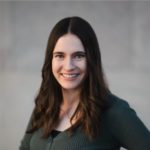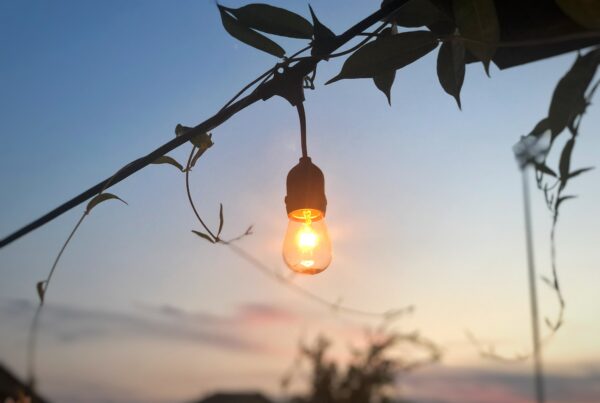It’s a unique time to be making a leadership transition. In the middle of a global pandemic, within a denomination asking big questions about its future, and amid protests against racism fueled by a movement fighting for the protection of Black lives, Earl James is passing the baton to Peter Watts as coordinator of the RCA’s African American Black Council (AABC). Peter will take on this new position while continuing to serve as pastor of The R.O.C.K. Church in Los Angeles, California. As Earl ponders retirement and Peter steps into a new role, I asked the pair about calling, their experiences as Black church leaders, where they’re finding hope right now, and what they think about the future of the church.
This conversation has been lightly edited and condensed for clarity.
How would you describe your calling?
Earl James
There was a period of my life when I felt like I didn’t have a sense of direction, and I remember distinctly a dream that I had. In the dream, there were hundreds of us standing in this dried up, gray field, and a voice was calling us to make a promise. Everybody got down on one knee. We put our right hands on the earth and pledged to try to work to make it healthier and to make it wholer. That dream has to be relevant to whatever I’m doing.
I also think of my calling as being a bridge. In my office in New York City, on one wall, I put a painting of Civil Rights-era people. And on the opposite wall, I had another painting of 12 children’s heads in a circle: different races, different nationalities, different religions. I used to wonder about the conversation between these two paintings: what would they say to each other? And then eventually, where am I in this? And what does my sense of call do? I imagined a rope between the two paintings and myself as a certain part of the rope. I belong to neither side. But I am a bridge.
Peter Watts
I believe that God has called me to the ministry of reconciliation. We’re all created in the image of God and called to be reconciled to him and one another. I believe that the church is still the hope of the world. And as kingdom citizens, I believe that we still have the responsibility to bring that hope and peace to a hostile and divided people.
The work that I do is deeply rooted in Luke 4:18 to 21 or 24. That’s kind of my life verse. So when I think about my life’s mission and my call, I often go back to Luke: the Spirit of the Lord is upon me because he’s anointed me to preach good news to the poor. The King James Version is the one I love the most because it also says, and he’s called me to heal the brokenhearted.
As societal divisions have intensified, do you think it’s gotten harder to pursue a ministry of reconciliation?
It is hard. I was feeling guilt yesterday. I’m seeing people who I know out in the streets protesting, and I’m on Zoom. A member of my church reminded me, ‘Your call is to the church. Those people that are on the streets protesting, those law enforcement officers that are dealing with these different issues, they’re in somebody’s churches.’
Earl James
You know, it’s interesting you start by asking about calling. One of the people whose works have really shaped me is Howard Thurman. Howard Thurman was a Black person who was a writer, a mystic, a poet, a theologian, a pastor, a dean, and a mentor to thousands of people across the country. One thing Thurman said about calling was, ‘Discover what makes you feel most alive and go out and do that.’ Search for what is in you that makes you fundamentally say yes and then keep that piece of you active. If there were more of us that lived like that, he felt the quality of our life would be much more spiritual. It would be much more God-honoring. It would be much more redemptive.
Both of you seem to see being a connector between different groups and spaces as part of your calling. Do you ever find that lonely?
Earl James
There’s an inherent loneliness in accepting a calling of bridging. Because while you connect to both the sides, you are not fully of any side. There’s enough of the smell of the other side on you. So where is home for you?
Peter Watts
It does make it really difficult to find a home. But what I have found over maybe the past four or five years is that there are a whole lot of people out there that are like me who are having the same experience. Those people are my tribe, the people who live in the middle.
How do you think God has called you to work with the African American Black Council (AABC)?
Peter Watts
I think it’s being in that middle space, being the connector. Rick DeBruyne once told me, ‘You know what’s so interesting about you and your leadership? Nobody can ever pigeonhole or marginalize you within the RCA. That’s a gift that you bring. Your work and your experience have been with the denomination as a whole and not just with one group of people.’
My experiences in the RCA through my classis, leading the Kingdom Enterprise Zone, different multiplication initiatives, those weren’t specifically about AABC, but those were specifically about the denomination as a whole. Those experiences and those relationships that I’ve been able to build, I now bring all of that to the role and the work within the AABC.
Earl James
One part of my call to the AABC was the strategic thinking piece: Where are we likely to be in 10 or 12 years? We have a lot of churches that are not intergenerational, whose average age is retirement age or higher. We need a new generation of churches that are either intergenerational or are decidedly Gen Y and Gen Z. My calling helped to identify the need, but somebody else’s calling has to get us there. And that’s Peter’s bread and butter.
What do you find challenging about being a Black leader in the church? What brings you hope and sustains you?
Peter Watts
There’s this idea that the Black church is a monolithic expression. When you say ‘the Black church,’ everybody has this one idea of what they think or feel the Black church is. Black doesn’t just mean Black. It’s Caribbean, it’s African, it’s descendants of slaves, of American slavery.
But I believe that the Black church, in its entirety, is a gift to the world. And I believe that the Black churches within the RCA are a gift to the RCA as well. When I think historically about the roots of the Black church, how the Black church was birthed, and how it’s been this institution of hope and justice around different issues throughout the history of our country, it is a gift.
What gives me hope and what sustains me also goes back to a person Earl James talked about looking up to: Howard Thurman. Looking at the life of Howard Thurman, he wasn’t the one on the frontlines protesting and in the newspapers. But he was the one that was the spiritual director for Martin Luther King and a lot of other activists. And so that’s kind of how I see my role in the world. I’m not trying to be in the newspaper and on TV in front of the mics. I want to be the person who helps to sustain the movement for the long haul. And so, in order to do that, I have got to be healthy.
Earl James
Howard Thurman seems to be a gift that keeps on giving. He also posed a question that comes to mind when I think about the challenges of being a leader:
If somebody from another world came and watched Christians, what would they conclude about our religious faith? Thurman thought they would conclude we are polytheists. They would observe that we have a god who is particularly important on Sunday, particularly important with credentialed leadership, particularly important for how worship looks. That’s the god of religion. But we also have a god of life. And this god of life deals with everything else in people’s lives. But Thurman thought to conclude we are polytheists would be wrong. He said there is only one God: the God of life.
When I read this question from Thurman, I decided I wanted to follow one God of life. But then my leadership challenge became, how do you grant the same space to everyday people as pastors, elders, and deacons? How do I say that what you do Monday through Saturday is at least as important, if not more important, than what we do on Sunday?
I can see where being coordinator for AABC would put you in a position where you'd feel like you're being asked to represent your entire race or speak for more people than yourself in a lot of conversations. How do you navigate that?
Peter Watts
One of the first principles of community development is listening to your community. And AABC is my community. So for me, it’s not that I’m speaking for my race. I’m speaking on behalf of people because I’ve listened to them and their questions.
If it’s taken as, ‘Well, whatever Peter says, that must be how all Black people feel,’ it goes back to what I said before: The Black community is not a monolith. Even during the Civil Rights Movement, there were a whole bunch of Black people that believed that Dr. King was doing too much, that he was causing a ruckus. When he wrote the letter from the Birmingham Jail, it was to white moderates, but he was also talking to some of the Black people in the city that didn’t want him to do what he was doing.
[sg_popup id=12312]
Earl James
If I’m saying something that is very forthright or very emotional, I find a lot of people’s first reaction is to say that I’m speaking for myself, and that I got something wrong. Other times they will have the view of, ‘tell me what Black people think. Speak for everybody.’ And there’s a tendency to get frustrated if I say I am not going to do that.
So I think one of my challenges as a Black leader is I always have to think about being a Black leader. I find I spend an exhausting amount of time figuring out how to package what I say so that either: I’m speaking on my own and taken that way, or I’m speaking for all Black people and it’s taken that way. I always have to think about how to position statements based on who’s in the room, and how what I say might get read.
Peter Watts
The bigger challenge behind that is, whoever’s asking the question is asking you because they’re afraid, unable, or unwilling to actually go and ask other people themselves.
Earl James
There’s a four-letter word for that: Amen.
As you each step into something new, what are you taking with you from your past experiences?
Peter Watts
Relationships, relationships, and relationships.
Earl James
At the top of our conversation, you asked about calling. And I described a dream I had about swearing to try to help the earth be restored in some way, shape, or form. That dream has always given me a guiding sense of why I was here. I think that dream will have a guiding sense in my retirement life, too.
I’m also carrying a challenge in that I have always seen myself as a provider, and that’s related to my job. I don’t want my wife to wish I would go get a job in retirement because I can’t figure out who I am. So I have a list of 30 things that in the next five to ten years I want to become good at or I want to experience. We should have this conversation a year from now, and then you should ask my wife Norma how it’s going.
Well, I'll call you up in a year. And I expect you to be the most accomplished person in the world by then.
I’m hoping in a year I’ll be telling you I should have retired five years ago.
Do you have any advice for Black people of faith, particularly leaders, about navigating this cultural moment?
Peter Watts
Attend to your soul. We talked about ministry of reconciliation earlier, but I think there are some prerequisites for that to happen. Racial tensions and racism and white supremacy, I think Black people need to be able to forgive themselves for internalizing a lot of that junk. These things mar the image of God in us. When you’re able to forgive yourself for allowing that stuff to take hold of you, maybe then you can move into forgiving other people.
I’m actually reading a book now by Barbara Peacock called Soul Care in African American Practice. It’s talking about the different spiritual practices and rhythms within the Black community. I’m revisiting those practices to talk about internal healing, emotionally and psychologically: getting therapy, seeing a therapist, normalizing therapy, and things like that.
Earl James
I’ve heard you say that before, Peter, and I have taken your word on that. I have a relationship with a counselor to help me figure out better ways of sifting and sorting all of this stuff that would dehumanize me. That advice is critical, particularly for those of us whose cultures bring taboo to doing that sort of thing.
There’s something my wife used to say a lot to people of color who moved to West Michigan that I think is apt in that it deals with being in an environment that is culturally not yours: Imagine this place as a beautiful lake or pond. The people that you have to deal with are fish in that pond, and they want to welcome you into that environment. They want you to spend time with them and their families. And they don’t quite understand why you don’t want to stay in the pond with them. Be in the pond when you can, but assert the fact that you’re not a fish; you’re a bird. You don’t have scales; you have feathers. You don’t have fins; you have wings. Your home is not underwater; it’s a nest in a tree.
Find your community that also lives in the trees and spend what time you can with them. Don’t turn your back on the pond and on the fish. They’re there for God-given reasons, too. But don’t let their God-given reasons for being there make you forget your God-given reasons for who you are and what you need to survive.
What do you hope for the church moving forward?
Earl James
The needs and requirements of maintaining existing churches are different than the resources and energy and creativity involved in doing a new ministry. I would encourage us to put a majority of our efforts into the way forward and a minority into maintaining that which is.
Peter Watts
I hope that when people experience life in the church, they experience something different than what they are experiencing in the world. And that they can take a taste of that to their everyday lives to create that same kind of experience for those who may never set foot in the building. In order to do that, my hope would be for the RCA to be open to innovation and creative thinking for the purpose of the world having this foretaste of the kingdom.
Grace Ruiter co-founded Faithward and oversaw its growth from a small blog to a ministry that reaches 100,000-200,000+ people each month. She has been asking too many questions ever since she started talking, and she has no plans of stopping now. Although her curiosity has challenged her faith at times, it's also how her relationship with God has grown to where it is today. You can get in touch with Grace at graceruiterwrites@gmail.com.




